"Expanding the transactional-transformative paradigm"
Leadership Research by
Dr. David A. Jordan
President, Seven Hills Foundation
Appendices
Appendix A
Selected Leadership Trait Studies and Identified Leader Traits


Appendix B
Selected Leadership Behavior Studies and Identified Leader Behaviors

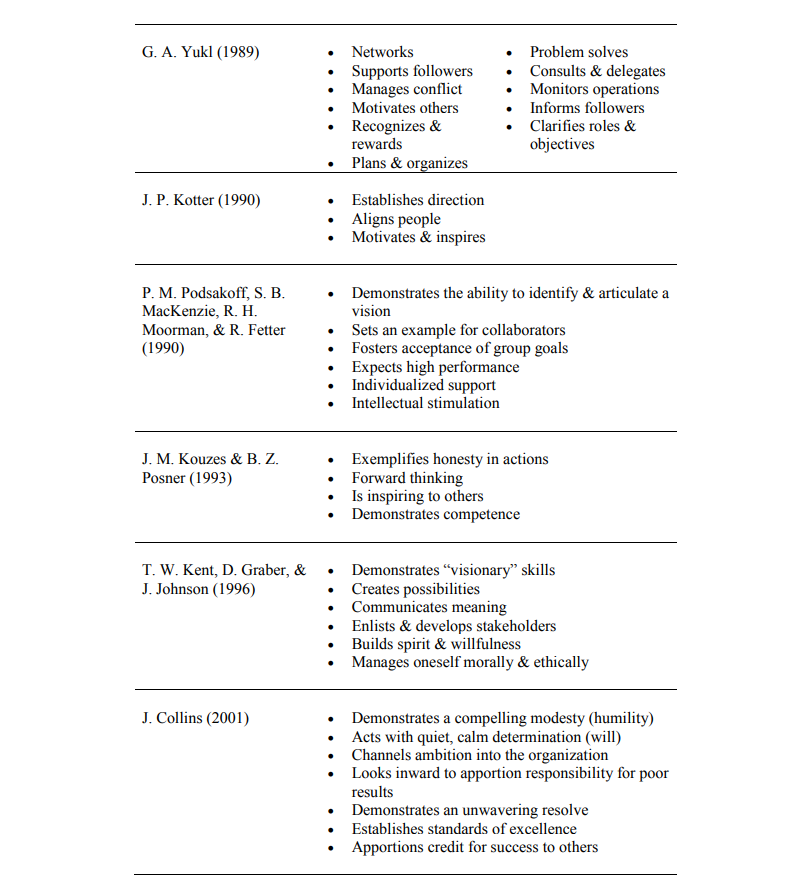
Appendix C
Leadership Theory Taxonomy



Appendix D
Glossary of Selected Leadership Theories, Constructs, and Approaches

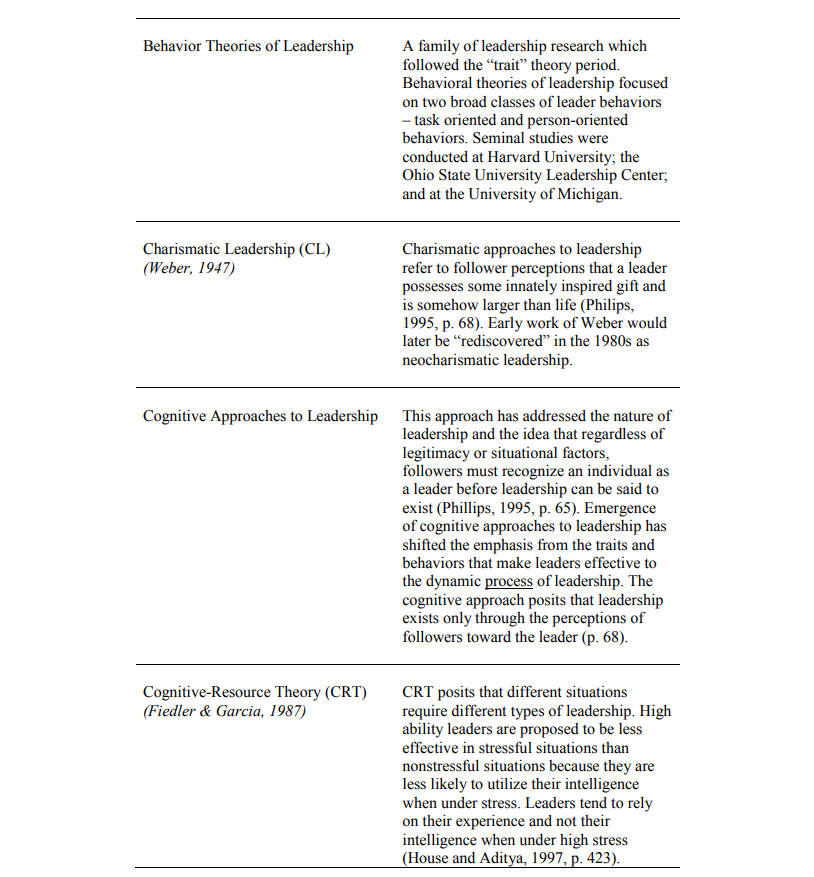










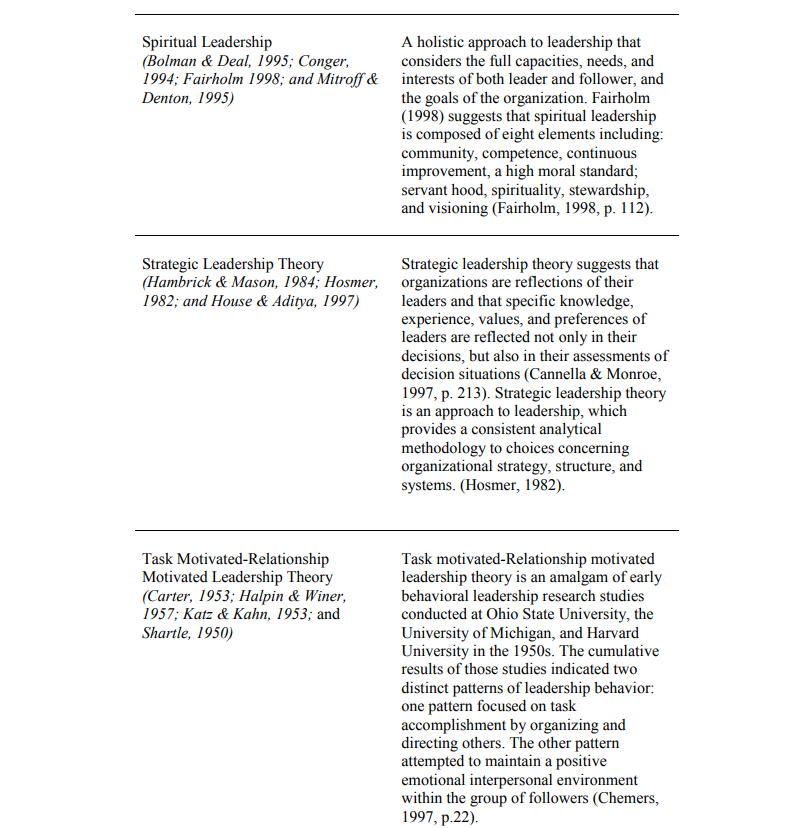



Appendix E
Expert Nominator Solicitation Letter
[DATE]
[Nominator (name, organization, and address)]
Re: Transcendent Healthcare Leader Research Study
Dear [Nominator's Name]:
I'm asking for your assistance in a national research study that is the basis for my doctoral
dissertation in Healthcare Administration and Leadership at the Medical University of South Carolina. The title of the dissertation is, "A Phenomenological Study of Transcendent Leaders in Healthcare". Your participation will provide valuable assistance with my research as I attempt to draw insights as to the reasonableness of a proposed new construct of leadership termed "transcending leadership". Transcending leadership has been posited by scholars as an iterative extension to the broadly accepted transactional-transformational leadership paradigm.
Specifically, I am searching for healthcare administrators of exemplary ability, character,
leadership behaviors, and personal values who have demonstrated extraordinary skills and characteristics, appear to set them apart from the quintessential "good leader". For the purposes of instigating this research, a tentative definition of transcending leadership is proffered:
Transcending leadership is dynamic leadership in the sense that the leaders throw themselves into a relationship with followed who will feel "elevated" by it and often become more active themselves, thereby creating new cadres of leaders. Transcending leadership is leadership engage, which demands attention to a moral virtue where: leaders and followers have a relationship not only of power, but of mutual needs, aspirations, and values; leaders take responsibility for their conduct, character, and commitments; and leaders and led reach out to wider social collectivities and seek to establish higher and broader moral purposes.
What am I asking of you? Identify three individuals in your Hospital Association/Medical
Society whom you believe most closely represents a "transcendent" healthcare leader.
I will send each nominee a letter noting who suggested their name and asking them to
participate in an informal open-ended questionnaire/interview. Additionally, I will ask you to also participate in an open-ended interview concerning your nominee(s). The findings of the study will be sent to all who participate.
It is my fervent hope that the findings will broaden our understanding of the situational
dynamics, characteristics, values, and leadership behavior of extraordinary men and women in the healthcare profession.
I have enclosed a self-addressed envelope to return this form once you have completed it.
If you prefer, please feel free to fax the completed form or email it to me by (date). If you determined you have no one who would be eligible, please return the blank form noting such. If you have any questions, or would like to confirm the nature of this dissertation research, my Dissertation Committee Chair, Dr. Andrea White, is available at the Department of Health Administration & Policy, Medical University of South Carolina (Whiteand@musc.edu).
Thank you so much for your help!
Sincerely,
David A. Jordan, MA, MPA
(Doctoral candidate in the Department of Health Administration & Policy, Medical University of South Carolina)
Tel: (508) 755-2340, ext. 230 FAX: (508) 849-3992 Email: djordan@sevenhills.org
Appendix F
Transcendent Leader (Nominee) Solicitation Letter
[Date]
[Nominee (name, organization, and address)]
Re: National Healthcare Leader Research Study
Dear [Nominee Name]:
[Nominator's Name] of the [Organization] has nominated you as an exceptional healthcare leader in your state. I am conducting a national research study on healthcare leadership evidenced through the lived experiences of individuals such as yourself. My hope is to begin to understand the essence of the leadership experience through a phenomenological/qualitative study of exemplary healthcare leaders from various geographic regions of the United States. This research is being conducted as part of my doctoral dissertation in the Department of Health Administration & Policy at the Medical University of South Carolina. I would be honored if you would consent to participate in this research.
What would your involvement consist of? Each of the nominated healthcare leaders will
be asked to participate in a 60-90 minute telephone interview involving open-ended questions. Following this initial interview, you will be forwarded a written summary of my interpretation of the significant themes you expressed. If you feel it necessary, a second clarifying discussion can then be scheduled to restate or inform the meaning of your responses. That's all! In turn, (name of nominator expert) will also be interviewed concerning his or her reasons for your nomination, the positive effects you have had upon your collaborators, and similar inquiries. All discussions will be held in strictest confidence and all data will be aggregated, thus ensuring complete anonymity. My interest is drawing a broad understanding of the traits, behaviors, defining backgrounds, and related attributes of exceptional healthcare leaders such as yourself.
Your participant is significant and could further our understanding of leadership as a
construct, both within and external to healthcare. May I receive your permission to participate in this study?
Your consent to participate can be accomplished in a number of ways - you can send me a
brief email expressing your willingness; you can sign and return the enclosed "Agreement to Participate Form" by mail or fax; or you can call me directly with your verbal acceptance - whichever is easier for you. Upon receiving an affirmative acknowledgement from you, I will call your office to arrange a time convenient for the initial phone interview.
Thank you so much, and I truly look forward to our collaboration on this important
study.
Sincerely,
David A. Jordan, MA, MPA
(Doctoral candidate in the Department of Health Administration & Policy, Medical University of South Carolina)
Email: djordan@sevenhills.org FAX: (508) 849-3882 Phone: (508) 755-2340, x230
Appendix G
Transcendent Leader (Nominee)
Consent to Participate Form


Appendix H
Study Participant Background and Organizational Context


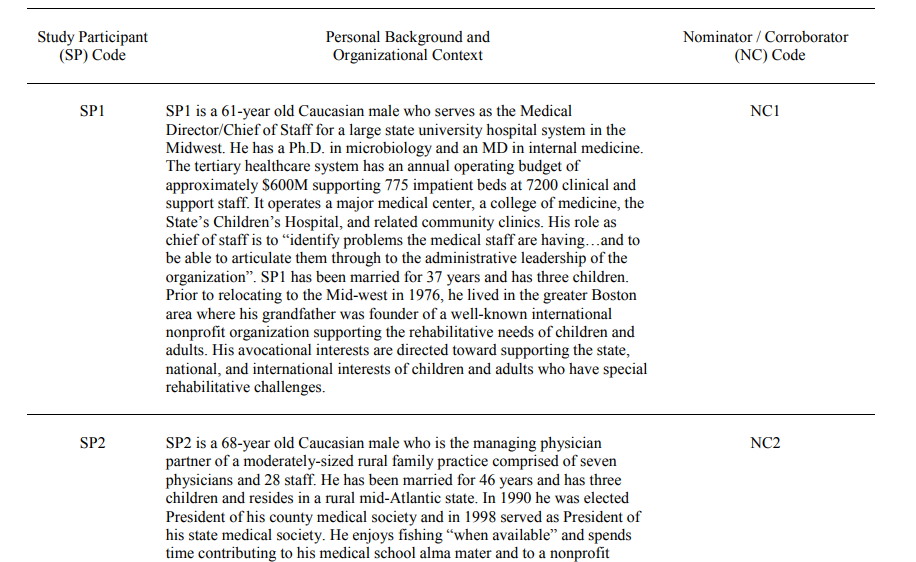




Appendix I
Interview Guide for Nominated Transcendent Leaders (Study Participants)



Appendix J
Corroborator Interview Guide

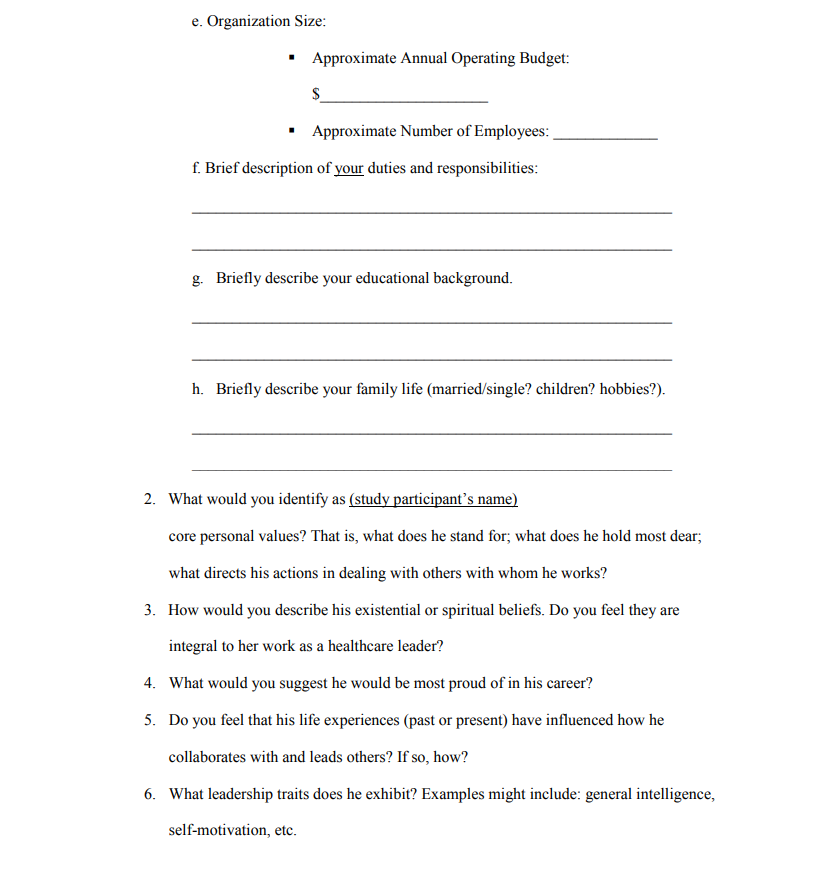

Appendix K
Reflexivity Mentor Guide Interview
Dissertation Research Project Title: "A Phenomenological Study of Transcendent Leaders in Healthcare"
Researcher/Author: David A. Jordan (Doctoral Candidate)
Degree Granting Academic Institution: Medical University of South Carolina/Department of Health Administration & Policy
Reflexivity Mentor: Thomas W. Kent, Ph.D.
Background of Reflexivity Mentor: Thomas W. Kent, Ph.D. is an Assistant Professor of management and marketing at the College of Charleston, SC. He is the author of numerous publications and articles on the leadership phenomenon.
Role of Reflexivity Mentor: The role of the reflexivity mentor is to engage in a dialogue with the researcher with the intention of entering into an honest introspection concerning the researcher's assumptions and biases pertaining to the study topic. Weber (2003) defines reflexivity as involving the "Interrelationships between the sets of [personal] assumptions, biases, and perspectives that underpin different facets of the research" (p. vi). As distinct from epoche and bracketing, which is carried out by the researcher in isolation, reflexivity necessitates the involvement of one or more individuals - broadly knowledgeable in the field of the research being undertaken - who serve to test the researcher's objectivity in designing the research methodology, gathering and analyzing the data, and drawing interpretations. The reflexivity process engages the researcher in attempting to understand the assumptions, biases, and perspectives that underlie all components of the research (Weber, 2003). To this end, reflexivity adds to the overall trustworthiness and validity of the research project. The following interview guide served to assist in framing the discussions between Dr. Kent and the researcher (David A. Jordan). This reflexivity exercise was conducted prior to the collection or analysis of research study data.
1. Why did you choose the topic of "transcending leadership" within healthcare as your
focus of study?
2. Do you feel you have already made up your mind as to what characterizes a
"transcendent" leader?
3. If you had to suggest a healthcare leader (or others) who might fit the definition of a
a transcendent leader, as you've posited in Chapter 1 of your study, who might that be
and why?
4. Do you think you've prejudiced your research problem statement, research questions,
or methodology based upon your "intuitive feelings" on the reasonableness of the
transcending leadership phenomenon?
5. To what degree have you already made up your mind about the prospective answers to
your research questions?
6. How would you feel if the data collected from your study participants did not
affirmatively address your research questions, but rather, presented negative or
discrepant information that runs counter to what you may have perceived the responses
to be?
7. Based on our conversations, do you now feel you can objectively solicit information
from your study participants and analyze the stories of their "lived experiences"
without replacing their voice with your own?
Appendix L
Expert Examiner Report
Dissertation Research Project: "A Phenomenological Study of Transcendent Leaders in Healthcare"
Researcher/Author: David A. Jordan (Doctoral Candidate)
Degree Granting Academic Institution: Medical University of South Carolina/Department of Health Administration & Policy
External Examiner: Gilbert W. Fairholm, DPA
Background of Expert External Examiner: Gilbert W. Fairholm, DPA is Emeritus Professor, School of Government and Public Affairs, Virginia Commonwealth University; Adjunct Associate Professor of Leadership at the University of Richmond; and Visiting Professor at Hampden-Sydney College. He is the author of numerous articles and books including Value Leadership: Toward a New Philosophy of Leadership (1991); Organizational Power Politics (1993); Leadership and the Culture of Trust (1994); Capturing the Heart of Leadership (1997); Perspectives on Leadership (1998); Mastering Inner Leadership (2001); and the Techniques of Inner Leadership (2003).
Role of the External Examiner:
The role of the expert external examiner is to review the dissertation project for coherency in design and comment as to the overall contribution the research study may make to the body of knowledge. As distinct from a peer examiner(s) or faculty research project committee, the external examiner offers a general "assessment of the research project [either] throughout the process of research or at the conclusion of the study" (Creswell, 2003, p. 197). The expert external examiner contributes to the "trustworthiness", "authenticity", and "credibility" (Creswell and Miller, 2000) of the research project. The comments that follow reflect Dr. Fairholm's examination of Chapters 1-3 with an accompanying review of Chapters 4 and 5.
Chapters 1-3
1. Does the Introduction (Chapter 1) properly introduce the research study by identifying
the research problem or issue in a clear manner? Is the research issue adequately
framed within the existing literature and are deficiencies in the literature points out?
(Creswell, 2003).
The research issues, research questions, and the definition of the leadership model - termed transcending leadership - and its place vis-á-vis other leadership models (especially that of Burns) are presented in a cogent way. Also, the author satisfactorily justifies the importance and relevance of his research and its place in contemporary leadership theory and places it in context of current thinking. Since his topic is new and, as yet, mostly unexplored, there is little applicable research to build upon, hence the major deficiency is in the absence of relevant data, not its inappropriate usage.
2. Do the research questions addressed in the study serve to narrow and focus the purpose of the
study? (Creswell, 2003). Do the research questions contribute to eliciting reader interest in the study?
The research questions are all on target, differentiate the key components of research that, if verified through his research will help validate this new leadership construct and determine its use by healthcare professionals. Careful research will also determine if transcending leadership is a discrete part of leadership theory and practice.
3. Do you have an specific suggestions or comments to the researcher concerning Chapter 1:
Introduction?
The author appears to have carefully thought through his project. He has presented a cogent case justifying its appropriateness as a dissertation topic, one that may actually contribute new knowledge to the body of existing leadership data. My only caution is that, since this research explores a new conception of leadership and is largely undeveloped in extant literature, every effort should be made to insure that reporting on all aspects of his research, findings and conclusions be presented to the reader as simply and clearly as possible eschewing unfamiliar vocabulary for a simple, clear and direct writing style.
4. In your opinion does the Review of the Literature (Chapter 2) adequately provide a case that
the study topic can and should be researched?
The candidate presents a complete and exhaustive review and analysis of current literature both about transcending leadership and all of the major and many minor leadership models posited in the last two or three decades - the first period of focused ferment in leadership theory-building (as opposed to merely expanding management theory-building to include leadership as just another task of management).
5. Dow the Review of the Literature (Chapter 2) adequately share with the reader the results of
other studies that are closely related to the study being reported? Does the researcher relate the
study to the larger ongoing dialogue in the literature concerning leadership theory, filling in
gaps, or extending prior studies? (Creswell, 2003, p. 29-30).
The author places transcending leadership squarely within the present ferment of leadership research. He discusses the contribution of the few other scholars who are exploring transcending leadership and places both their contributions and his proposed research in proper context or servant, strategic, and spiritual leadership - all relevant threads of current research that hold great promise of defining leadership for the first time as a body of knowledge separate from any other social group role, including management.
6. Within the literature review, does the researcher provide a framework for establishing the
importance of this study, as well as a benchmark for comparing the ultimate results of the study
with other findings (p. 30).
Yes, the candidate makes a compelling case for the need to develop operational validation of what is at this time mostly an intellectual construct. He shows evidence that he is aware of both the strengths and shortcomings of present leadership models and of his intention to validate major theory elements related to transcending leadership and those other models that are intellectual kin to that model.
7. Does the researcher clearly describe the strategy of inquiry employed in the research study
(Chapter 3: Methodology)? In your opinion, does the phenomenological-qualitative approach,
as described, appear coherent with the overall purpose statement of the study and the research
questions posed?
The candidate's methodology is clearly stated and reflects both phenomenological and parameters and the intrinsic logic dictated by this kind of a qualitative study. It appears to this reader that the approach selected is one of the best to test his assumptions and produce useful data upon which to develop answers to his three questions.
8. Are the standards of research methodology suggested in this study comparable with the
standards in other dissertations, which you have examined?
The candidate's methodology is similar to at least two of the last three dissertations I have supervised or advised upon. He appears to be directly on target to have his research produce actionable data.
9. What is your opinion on the overall value of the research topic (i.e., the reasonableness of
transcending leadership construct) and the methodology suggested to investigate it?
Transcending leadership is a little discussed element of Burns' work. It needs elaboration and application to real world experience to help validate (or not) this construct. It is especially relevant to contemporary leadership studies given the fact that spiritual leadership - a related construct - is receiving so much attention today. Knowing how - if at all - transcending leadership fits into the leadership matrix will be a valuable addition to our theory-building data foundation.
10. Please list any particular strengths, weaknesses, or distinctive/innovative features noted in Chapters 1-3 of this research project that would be worth drawing to the attention of the researcher's (David Jordan) dissertation project committee.
I believe the methodological approach outlined to be totally appropriate to this research project. It is a legitimate methodology that mirrors several past and currently on-going projects of my experience. Given this situation, the data from several research studies using similar methodological process will ease tasks of comparing and contrasting findings and conclusions and will strengthen the findings of each study.
Signature: Gilbert W. Fairholm /s/
Gilbert W. Fairholm, DPA
Emeritus Professor
Virginia Commonwealth University
Date: August 20, 2004
Chapters 4-5
Dissertation Research Project Title: "A Phenomenological Study of Transcendent Leaders in
Healthcare"
Researcher/Author: David A. Jordan (Doctoral Candidate)
Degree Granting Academic Institution: Medical University of South Carolina/Department of
Health Administration & Policy
External Examiner: Gilbert W. Fairholm, DPA
11. To what degree has the researcher succeeded in communicating a holistic picture of the "lived
experiences" of the study participant's (Chapter 4: Results)? Has the researcher offered a
sufficiently rich description of the leadership experience as seen through the eyes of the study
participants, so as to vicariously experience the subject's world?
The candidate has demonstrated a comprehensive understanding of the inner nature of his study leaders. He has identified a variety of personal and interpersonal characteristics (i.e., traits, values, spiritual consciousness, etc.) to help the reader understand the innate character of his leaders. He has also integrated this essentially emotional data into the contemporary leadership literature in way that validate his findings vis-á-vis the latest research in the field. He has made his subjects and subject come alive.
12. Have multiple strategies (i.e., triangulation, etc.) been cited for validating the findings? Has
the researcher clearly noted the outcome of the study (i.e., responded to the research
questions) and provided a narrative picture of emergent themes? (Creswell, 2003, p. 180).
Yes. He has explored most of the important themes in present-day leadership research and has added detailed individualized (and aggregate) data that flesh out his research and provide a complete response to the research questions posed. His effort to integrate a lot of disparate data into three themes - emotional intelligence, determined resolve, and other-interest - helps the reader understand his feelings and their meaning and provide foundation for his transcendent leadership model.
13. Does the researcher's interpretation of the data (Chapter 5: Discussion) respond to the
question, "What were the lessons learned?" Did the researcher successfully compare the
findings with information gleaned from the literature and extant theories? Does the study
suggest new questions that need to be asked? (Creswell, 2003, p. 195).
Chapter 5 successfully captures the essence of both the candidate's research and the extant literature and develops a compelling case for transcending leadership. He notes needed areas of further research and integrates his finding into the emerging literature of values and spiritual leadership. He also raises specific areas for further research and theory-building.
14. Please note any particular strengths, weaknesses, or distinctive/innovative features within
Chapter 4-5 that would be worth drawing to the attention of the dissertation project
committee overseeing the work of the researcher.
His case for transcending leadership characterized by other-interest, emotional intelligence, and determined resolve expands present theory. His logic is consistent and cogent. His understanding of existing literature is, for this reader, extensive, relevant, and comprehensive. While he mentions values/spiritual leadership in his paper, had he given more attention to this evolving theory, it would have strengthened an already solid argument.
Signature: Gil Fairholm /s/
Gilbert W. Fairholm, PDA
Emeritus Professor
Virginia Commonwealth University
Date: 2/5/05
Appendix M
Medical University of South Carolina
IRB for Human Research Approval
(Exempt Research)
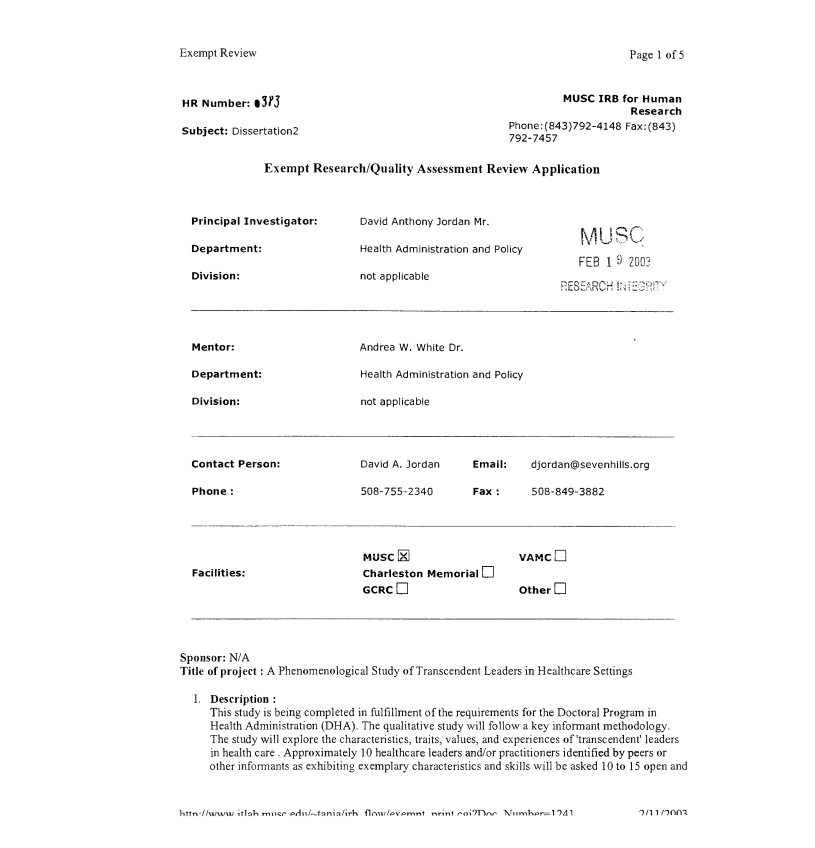




Appendix N
Nominator-Corroborator Essence Description of Perceived Transcendent Leaders
Nominator-Corroborator (NC) Essence Description of Study Participants (SP)
Nominator-Corroborator 1 (NC1) Essence Descriptions re: SP1
• "He [SP1] exudes honesty, credibility, and integrity."
• "He's very brilliant and I think one of the things that makes him so well respected and such a
gifted leader is that he is very slow to react. When it comes to decision-making, he prefers to
gather lots of information and sometimes if you gather lots of information about an issue
eventually the answer just presents itself. He has taught that to me."
• "He's sort of the strong silent type intellectually speaking. He's not bragadacious or grandiose.
He's very cerebral, but also delightful company."
• "Credibility and purity of motive are his most notable [characteristics]. With Dr. [SP1] no one
ever wonders if there is an undercurrent agenda; what he says is where his heart is."
• "His credibility and intellectual honesty inspires [others] by example."
• "I don't think there are many [physician-leaders] that have the qualities of intellectual capacity,
judgment, empathy for others, compassion, and policy understanding to the degree that he
does. I think it's the blend of all of those qualities that made me suggest him [as a perceived
transcendent leader] among our 4000 plus physician members.
Nominator-Corroborator 2 (NC2) Essence Descriptions re: SP2
• "His interactions with others are based on his moral standards. He's probably the most
optimistic person I've ever known."
• "The thing that stands out is that he's willing to do what other people often don't want to do."
• "He puts other people before himself; his own self-interests. I think his focus has always been
on one, what's good for patients; two, what's good for the [healthcare] profession; three,
what's good for the individual doctor; and lastly, what's good for him - if anything at all."
• "In terms of leadership characteristics, I think his respect for other people, his tolerance for
different opinions, his compassion [are notable]. He's a consensus builder and non-
judgmental [in that] he has the ability to identify and bring together the right mix of
personalities, perspectives, and opinion makers in order to reach consensus [on a problem]."
• "He's very informed on the issues and thinks before he acts."
• "He's very sensitive to the needs of others and he understands the power of leadership."
• "... when you first meet him, you may not be much impressed; he's not much of an imposing
looking figure - a little disheveled, he lives in a modest home and does his own shopping at
the grocery store. But, he's very optimistic and he's selfless. He prefers others to get the
credit for a lot of what he does.
• "One last thing that sticks out for me about [SP2] is that some people aren't leaders; they just
hold leadership positions. Some lead by intimidation and some lead by controlling a clique.
[He] leads by bringing people together using just thoughts and ideas and persuasion and
consensus building.
Nominator-Corroborator 3 (NC3) Essence Descriptions re: SP3
• "She deeply believes in helping people and giving people a chance to succeed."
• "She has great personal integrity and insists upon always doing the right thing. She's strong,
but not overbearing."
• "She is someone who is able to quell an insurrection."
• "Her ability to connect with people and thus motivate [them] which leads to getting things
done."
• "She exhibits a lot of authority in her work and the way in which she conducts herself."
• "I marvel at her ability to move people forward."
• "[She is] a leader who listens and helps others to understand the importance of their actions."
Nominator-Corroborator 4 (NC4) Essence Descriptions re: SP4
• "He's diminutive in stature, but his story is absolutely exciting. He really is a great man
among physicians."
• "He's a remarkable guy because he rose, out of what you might say adversity, to become a
tremendous and important person for the Chinese community, the San Francisco community,
and also for the profession of medicine."
• "He isn't a guy that commands respect for his personal style. He isn't a calm rudder. He's
passionate about things he believes in and that shows through. Again, by example he's
inspired colleagues by virtue of how hard he works and his set of core values of
commitment to his community, his family, and the overriding benevolence he shows to
everyone he comes in contact with."
• "[SP4] remains a unique person who stands out in his whole ethnic group across this country.
He's not a polished Harvard professor that grew up here and went through the Ivy league
experience. He's a guy with roots in [two] cultures. This guy overcame the stigma and
adversity during the time of discrimination [World War II] and overcame that. In doing so,
he lifted his own community; he lifted his entire community.
• "... for thousands of kids in San Francisco he was the inspiration; he's what the mothers and
fathers said, "you can be like Dr. [SP4]."
Nominator-Corroborator 5 (NC5) Essence Descriptions re: SP5
• "[SP5], just like every human is very complex... I've seen him humble and I've seen him not
humble. Doing the right thing is a phrase that fits him."
• "Church and spirituality is very important to his whole family. He's deeply involved with the
[Catholic] church."
• "I think he would be most proud of the role he played in bringing Medicaid equity to a
national agenda. He has helped bring Medicaid equity to his state and 23 other states."
• "When he talks about something and you're in the room, it's hard not to be infected by him
and his passion on issues [which] are intended to benefit others."
• "He inspires people by the depth of his own commitment and his own willingness to
sacrifice [for others]."
• "Not many doctors have done things on the scale [SP5] has done on healthcare policy issues
which effect millions. Few of them reach as deep as [SP5] does in terms of macro
[healthcare] policy issues and understand the micro impact of those macro issues."
Nominator-Corroborator 6 (NC6) Essence Descriptions re: SP6
• "He shares that sense of doing the right thing for the public; improving the health of the
community."
• "When you're in a meeting and everything is falling apart, that's when [he] will ask the
group in question, the answer to which is so obvious that it leads everyone to a consensus
point. It's actually a startling, unnerving capacity that he has to know exactly when to say
something in a way that doesn't tell people they're wrong, but asks them what's right...
which creates a consensus to go forward."
• "He's a tremendous facilitator... He's viewed with awe by everyone [other hospital CEOs] in
this state. He basically saved healthcare in much of southeastern rural New York."
• "Steady personality, very rarely ruffled. He has a lot of humility and a lot of determination
to serve."
• "It's apparent to me that there is a deep sense of spirituality that surrounds much of what he's
about... but I don't know if he even goes to church or not, but you feel his spirituality."
Nominator-Corroborator 7 (NC7) Essence Descriptions re: SP7
• "[SP7] believes in equity and fairness and what's right. He really turned out to become the
conscience of the [healthcare] industry and his whole philosophy is that every person has a
right to health and dignity; and this is what drives him in everything [he does]. He has
deeply ingrained ethical principles - uncompromising moral principles - that have pushed
our whole [healthcare] industry in a different direction. It's pretty remarkable to watch."
• "He's probably the most brilliant guy I've ever met."
• "He's brought compassion back into the business aspect of running healthcare programs...
and is the only MD/CEO of any large hospital system in Texas that still does rounds with
patients."
• "He's brilliant, value driven, and extremely dedicated. He is very spiritual, but his spiritual
values come through in a generic way. He's one of those guys you can't help but like."
• "[SP7] exudes something that none of the rest of them [peer CEOs] do all the time... that is,
he has the ability to think "community needs" all of the time."
• "He was the leader who single-handedly got legislation passed to create an indigent
healthcare treatment act... it got Texas away from an attitude that [the indigent] is just a
group of lackluster people who sit on their front porches."
Nominator-Corroborator 8 (NC8) Essence Descriptions re: SP8
• "[SP8]'s values include his passionate care and concern for other people. He also really
likes to get things done; his ideals accomplish [things] so that people can benefit. And
third, I would say that his family would rank as a core value for him."
• "He has a warm personal aspect about his, but [he] can be very decisive in a heartbeat."
• "He's never fully satisfied and always want to improve upon what exists or creates new
situations which others can benefit from."
• "He's so driven, but at the same time so benevolent when it comes to people."
• "He's a real consensus-builder, which is the Vermont way, and so very people-oriented. He
doesn't seek the limelight and in that way he's a pretty humble guy who, due to his style of
leadership, engenders real loyalty."
• "[SP8] is a very steadfast in his approach to issues, and advises others without being seen as
critical. I've always admired that about him."
• "He has a drive mixed with balance and humility. He likes to see things happen - he likes
change if it will help other people."
Nominator-Corroborator 9 (NC9) Essence Descriptions re: SP9
• "What he's accomplished at [his organization] in the past 20 years of his leadership is
taking a suburban, garden variety, community hospital - defining the mission more broadly
and moving that into a premier national [healthcare] organization.
• "He's not someone who beats his own drum, he's very self-effacing."
• "... [one] cannot become impressed with his abilities that include, among other things, this
extraordinary fore-sightedness. Not what we're doing today, but what we should be doing
for the welfare of our community ten years down the road."
• "He inspires this sense that we are going where we need to go, but wherever we need to go
isn't where we are today."
• "... he's a very strong family man and is devoted to them, and he possesses a genuine caring
spirit for people."
• "In my own experience I'd say he motivates [people] quietly. It's more of a 'come let us
reason together' approach, rather than the big platform - big speech - the big sermon type
of thing. Having dialogue in the true sense of what dialogue means with people - about
how we need to get on with what we need to do."
• "He's humble, quietly directive in his [leadership] approach, and successful... and
obviously he has a very strong intellect. We're not dealing here with a man of meager
intelligence. [SP9] is very bright and is very forward thinking - forward looking."
• "[SP9] spends a lot of time in contemplation as to what we are versus what we should be
and then articulating that vision. He is always trying to get himself and others where
they've never been before."
• "This man is a deep thinker."
Nominator-Corroborator 10 (NC 10) Essence Descriptions re: SP10
• "[She has] a commitment to service and to make a difference in the lives of others. She
just has a real desire to make a difference."
• "She rises to leadership because she's able to get people to work together, to commit to
goals that they may not have otherwise."
• "I would say spirituality is a core value to her, but not in a dogmatic religious sense. She's
very comfortable with people of all types of backgrounds."
• "She's very much a self-made person who came up through the ranks. She rose to the
position in the hospital she ran, by starting off as an admitting clerk."
• "She certainly makes you feel like you're special and she believes in you. She talks to you
in ways that make you feel like you're doing something very special; it's a rare quality."
• "People love her... it's a rare person who is able to accomplish as much as she has and
make people around them feel so good about what they're doing."
Nominator-Corroborator 12 (NC12) Essence Descriptions re: SP12
• "[SP12] believes in the worth of individuals. His values are integrity and moral [character].
To me he epitomizes a strong code of ethics."
• "He's a solid husband and father."
• "He really has a strong commitment to his institution and community; not just himself.
He's very selfless."
• "[SP12] is a phenomenal listener! He comes into a discussion and he will listen. He knows
how to bring people together in a non-confrontational way. When [SP12] says something,
he's like an E. F. Hutton commercial - people listen."
• "He's self-disciplined, not prone to excesses in any way. He's very humble, very
determined."
• "He inspires people [by expressing that] he believes in you. He says, "you go do it and I'll
back you up 100%, and if it doesn't work, I'll still back you up."
• "I think that there are [only] a couple of people in this state like him, but [SP12] epitomizes
in my mind why we went into the healthcare field... you do it to strengthen the
community."
Nominator-Corroborator 13 (NC13) Essence Descriptions re: SP13
• "The first impression you get [of SP13] is a strong forceful leader, very charismatic - cuts
to the chase - low tolerance for bullshit. And yet, at the same time, he has a clear focus,
vision, and then leading into things like integration of effort - a sense of egalitarianism;
combining a nonprofit hospital mission with a sense of social justice."
• "The overriding dynamic is [SP13]'s own passion; that's what you feel, his passion for
getting things done for the right reasons."
• "I think he's a faith-filled person, but I don't know if you'd call him religious."
• "I just think that no one else [other than SP13] can move things along - transcend the
current healthcare environment - better than him."
Nominator-Corroborator 14 (NC14) Essence Descriptions re: SP14
• "[As a Native American] he has a desire to represent minorities, hence he has an incentive
to be fair and then they [minorities] are represented in society."
• "He has a wonderful desire to just serve [others] and be a good leader. He's very
innovative, he's conscientious, intelligent, articulate, a good work ethic. [SP14] has a
desire to move things ahead; a desire to be innovative."
• "He's self-motivated and certainly very ethical. This is a man of integrity."
• "He draws people out and tries to use serendipity; a sense that they're [he and his
followers] benefiting from one another... he seeks their counsel and, in turn,
communicates to them what he's thinking and then they build on that to come up with
solutions. He's very dynamic."
• "I just really respect the guy... [he] just seems to be on top of everything."
Appendix O
Selected Leadership Characteristic Studies and Identified Leader Characteristics

